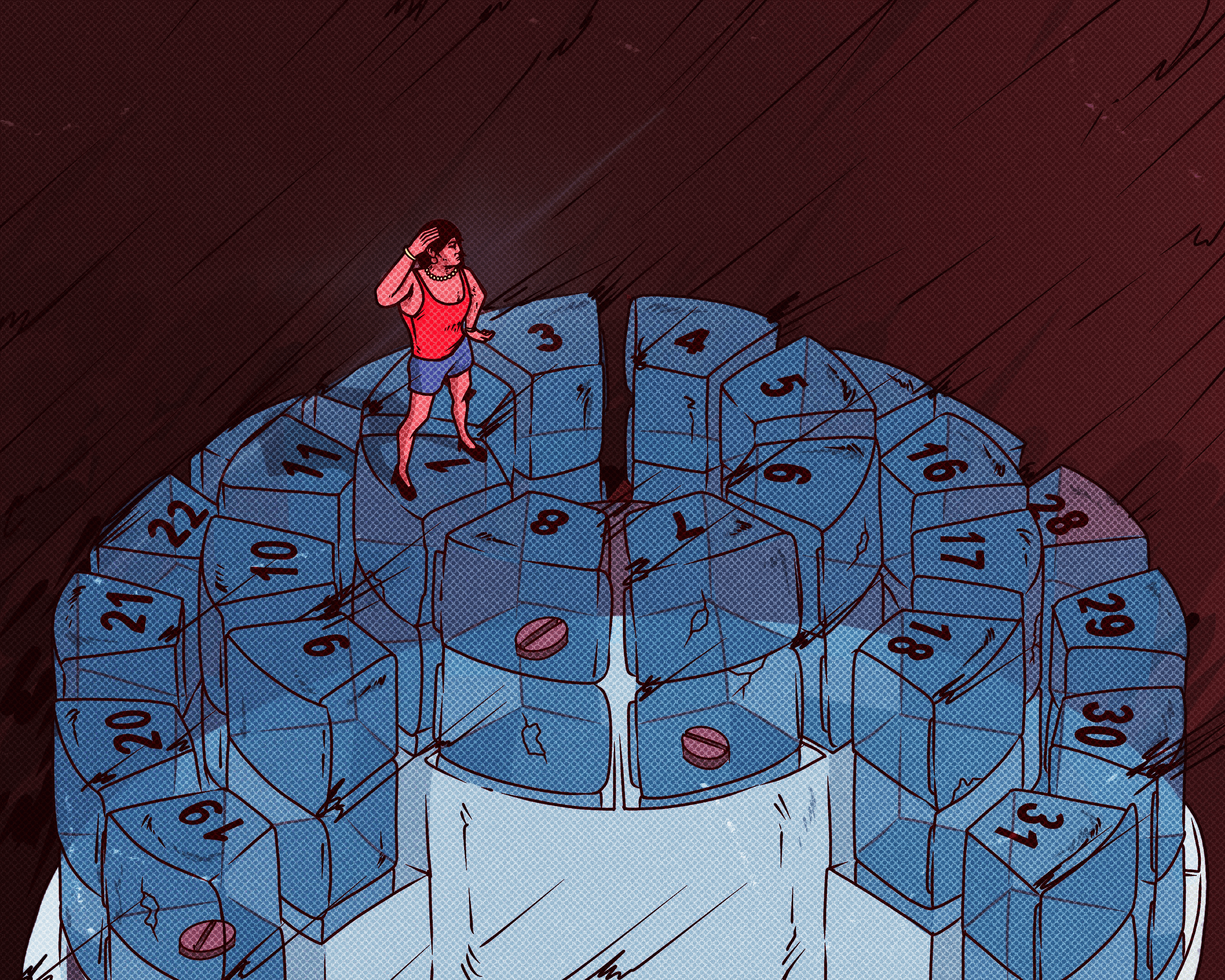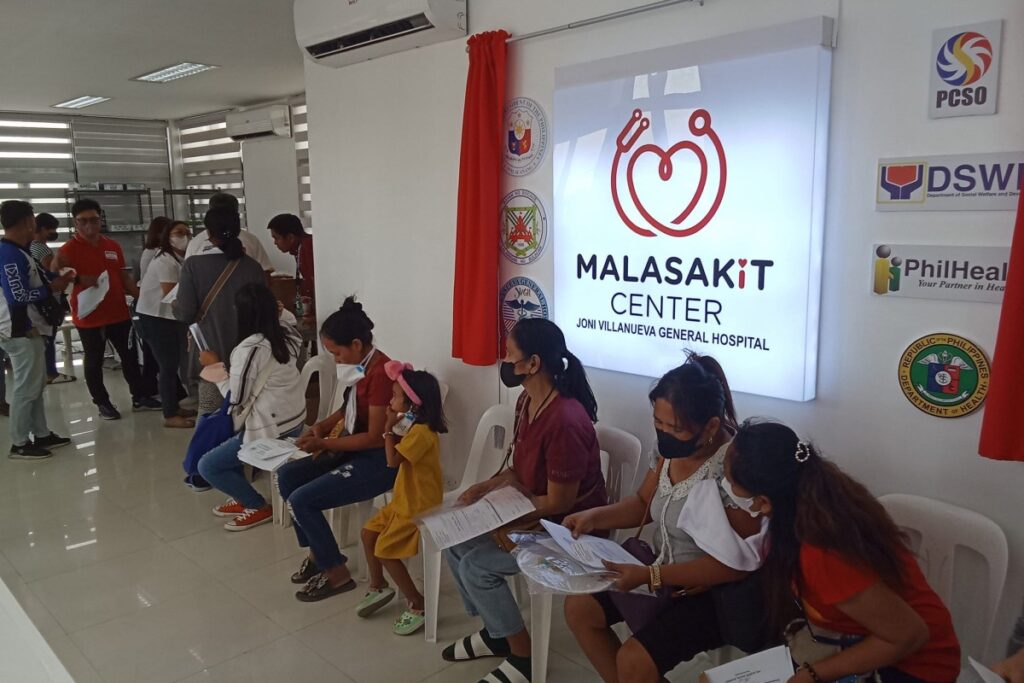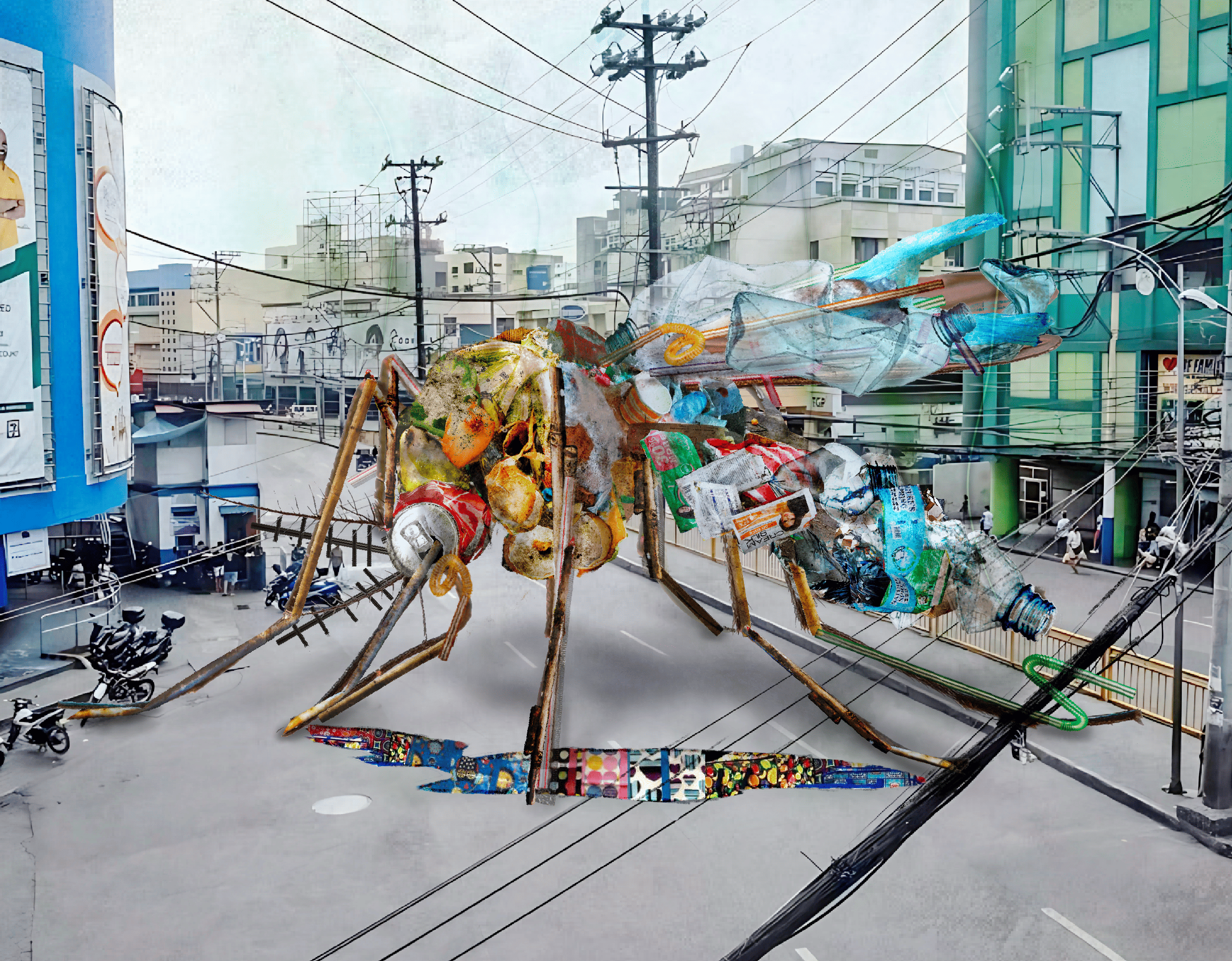Rue Cerbatos, 22, broke new ground at Arellano University - Jose Abad Santos Campus as the first transgender student to wear her desired uniform. But donning the blouse and skirt that affirmed her womanhood was not enough for her, prompting her to take the next step in her gender transition.
Every day at 8:00 p.m., Rue takes Diane 35, an anti-androgen medication she buys from TikTok Shop. Ignoring the hunger, palpitations, and financial strain brought by such a tiny pill, she religiously sticks to the nightly regimen that has saved her from a life of debilitating gender dysphoria — the distress arising from a mismatch between a person’s gender identity and sex assigned at birth.
Most trans Filipinos like Rue engage in do-it-yourself gender-affirming hormone therapy (GAHT) due to the high cost and lack of providers of medically assisted GAHT, according to Ame Lopez of the Philippine Professional Association for Transgender Health, a nonprofit organization promoting and providing equitable gender-affirming care.
While medically assisted GAHT and quality gender-affirming care remain widely inaccessible in the Philippines, Rue and many others are poised to continue resorting to DIY GAHT despite the perils entailed by it.
Transition Troubles
Without the guidance of a doctor, Rue asks fellow trans Pinays in Reddit or TikTok their recommended effective “combo” of estrogen and testosterone blockers. Seeking advice from trans Pinay influencers or elders regarding DIY GAHT is a shared experience among Lopez’s trans patients before they consulted with her.
Diane 35 is one of the most common DIY GAHT for trans Pinays because it contains estrogen and has testosterone blocker properties, said Rue and Lopez. Primarily a treatment for androgen-dependent acne, excessive hair growth, and hair loss, it requires a doctor’s prescription and is priced at around P710 for a box of 21 pills in pharmacies. To cover a month of maintenance, one is inclined to buy two boxes, bringing the monthly expense to P1,065.
Rue purchases Diane 35 without a prescription and at the cheaper price of P330 to P390 per box from resellers in Shopee and TikTok Shop due to voucher discounts and claims of the product being directly sourced abroad. However, the lack of regulation raises concerns about the authenticity of such claims and the product’s safety for consumption.
The self-administration of GAHT can also lead to overdosing, which increases the risk of stroke, liver damage, heart attack, and obstructive blood clots, explained Lopez. Rue herself recounted experiencing the worst palpitations on days she failed to take Diane 35 on time — an inconsistency caused by her financial incapacity to keep a full monthly inventory of the product.
Rue has since reconciled the medical and legal dangers of makeshift GAHT with the joy she feels from finally having her womanhood validated. “Pag malala na din yung gender dysphoria mo, parang wala ka nang pake kahit grabe yung side effects. Pag naranasan mo na yung euphoria ng bet mo talagang identity or kasarian, mahirap nang bumalik sa dati,” she said.
Prior to transitioning, Rue experienced gender dysphoria that greatly limited her social life and sense of security. Now, she can go out into the world with renewed confidence, assured she will be addressed as “ma’am” and can use the women’s restroom without receiving strange looks from others.
The Standards of Care followed by transgender health specialists around the world identify GAHT as a medical necessity. GAHT has saved the lives of many trans youths encumbered by higher rates of anxiety, depression, and suicidal ideation than their cisgender peers due to gender dysphoria and discrimination, according to a 2022 article from Columbia Psychiatry.
To maximize the benefits of GAHT and minimize its risks, trans individuals are urged to consult with doctors who can provide and monitor the proper dosage of hormones. They are also encouraged to routinely undergo baseline laboratory tests and check-ups to ensure their bodies are receiving the treatment well.
“Pero syempre isa pa lang akong estudyante kaya parang problemang pinansya talaga yung hadlang sa pag-akses dito [transgender health],” said Rue who receives a daily allowance of P300 — just enough to save for the much cheaper DIY GAHT.
In contrast, trans Pinays, under the guidance of doctors, spend around P1,500 to P2,000 on monthly hormones. Doctor visits, on the other hand, average P500 to P1,500, while regular laboratory tests are around P1,000, said Lopez.
Such high prices, coupled with the persistent banning of hormone resellers in Shopee and TikTok Shop due to violation of drug laws, have only made GAHT further out of reach from trans individuals.
But DIY GAHT will continue to proliferate in alternative markets as long as the health care system excludes trans lives from its supposed universal service.
Transgressive System
The Philippines is decades behind in transgender health due to scarce support from the national government, painting a picture of a health care system far from being inclusive and accessible.
By the 1960s, one of the first federally funded transgender clinics offering gender-affirming surgeries was opened at the John Hopkins School of Medicine in the US. No such institution initiated by the national government has materialized in the Philippines.
Private transgender clinics in the Philippines have tried to fill the gap, offering complete and convenient gender-affirming services. However, their high costs dissuade prospective patients, said Rue. It does not help that GAHT and gender-affirming surgeries are not covered by PhilHeath, the Philippines’s national health insurance program.
Additionally, private transgender clinics are not subsidized by the government which could otherwise help make them affordable. And while publicly funded, the Philippine General Hospital’s Sexual and Gender Minority Clinic, which offers affordable gender-affirming treatment management, is subject to perennial budget woes that affect its operations.
For Thaddeus Averilla of the Philippine Professional Association for Transgender Health (PPATH), another factor behind the inaccessibility of gender-affirming health care is the lack of doctors interested in specializing in transgender health. He traced the disinterest to the absence of the field in medical school curriculums approved by the Commission on Higher Education.
In response to the national government’s inaction in institutionalizing transgender health in hospitals or education systems, nongovernmental organizations have stepped up to address the service deficit. NGOs such as Victoria by Love Yourself and Trans* Health Philippines offer free GAHT consultations and counseling. PPATH also produces and distributes updated medical knowledge related to transgender health.
However, since NGOs’ services are free, there is a long waitlist that can be unbearable for trans individuals experiencing severe gender dysphoria, said Rue. Most free clinics also do not offer baseline laboratory tests which are prerequisites in prescribing GAHT. “Yung starter pack [na tests nasa] P10,000 kahit libre lang yung consultation,” she added.
NGOs’ sustainability is also left at the behest of their donors. Trans* Health Philippines, for example, derives its funding from institutions such as the US Agency for International Development and the US President’s Emergency Plan for AIDS Relief.
Some trans Pinay activists expressed fears about the possibility of GAHT and HIV-AIDS resources being cut off under Donald Trump’s presidency, whose winning campaign and impending Project 2025 promised to roll back queer rights and services.
Amid constraints faced by NGOs and private institutions in bridging gaps in services, Rue and PPATH demand the government to pick up its slack in making health care genuinely universal through policies protective of the LGBTQ+ community.
Transcending Barriers
Trans Filipinos like Rue yearn to see the Philippines with free, quality transgender health made possible by the synergy of civil society and the national government in policymaking. The national government can follow the milestones of local government units and NGOs in making transgender health accessible, said PPATH.
In September, the San Jose Del Monte LGU in Bulacan, in partnership with NGOs and US institutions, opened the first LGU-operated transgender clinic in the Philippines. It offers free GAHT consultations, counseling, and laboratory testing.
Last June, the Quezon City LGU, in collaboration with NGOs and other foreign institutions, launched the QC Strategic Trans* Health Access to Resources and Services (QC STARS) Program. QC STARS’s plan to provide free GAHT counseling, assessment, and management will be institutionalized once its accompanying ordinance gets enacted.
The QC STI, HIV, and AIDS Council have since approved a resolution in September that urged the city council to expedite the passage of the QC STARS Ordinance. As of October, the ordinance underwent a public consultation under the city’s Committee on Health and Sanitation.
The Philippines may also follow the ways of Malta which fulfilled most of the trans health indicators set by Transgender European Union, a nonprofit advocating for trans rights. In Malta, up to 70 percent of the cost of trans-specific psychological and psychiatric care, GAHT, and surgeries are covered by public funding. Trans individuals under the age of 18 can also access GAHT without third-party authorization, curbing youth cases of self-medication.
Before institutionalizing transgender health in their respective localities, QC and San Jose Del Monte have passed their own anti-discrimination ordinances specific to violence based on sexual orientation, gender identity, and expression (SOGIE). QC also introduced the Right to Care Card last year which gives queer couples the right to make medical decisions for their partners.
For Rue and Averilla, the passing of the SOGIE bill, a national anti-LGBTQ+ discrimination measure that has been languishing in Congress for two decades, may serve as an impetus for more progressive legislation like a national transgender health care framework. A Senate version of the SOGIE bill was reverted to the committee level in February last year after finally reaching the plenary sponsorship level, while the House of Representatives’ version was approved at the committee level in May last year but has not progressed since.
“Siguro yung first step talaga [ay] ipasa na nila yung SOGIE Bill para may panlaban na talaga yung mga bakla sa mga sistemang nan-di-discriminate,” said Rue.
The upcoming midterm elections present a chance for the youth and queer community to lobby for LGBTQ+ protective legislation and elect allies who will commit to those platforms, said Averilla.
Rue’s experience demonstrates how trans Filipinos are forced to build their own paths, regardless of the perils, in a health care system that remains anything but universal. Until the government steps up, Rue and others like her will continue to navigate the shadows, demanding a future where their identities are recognized and affirmed with due care. ●







